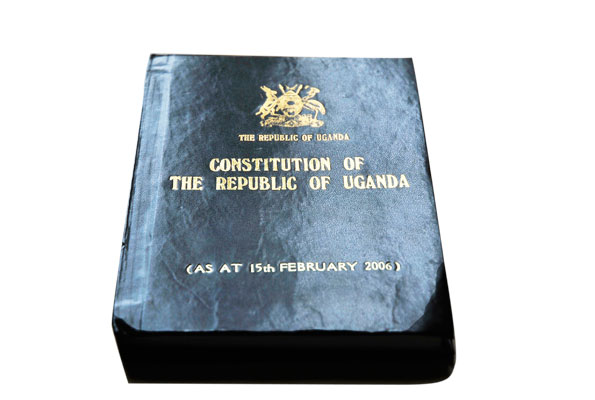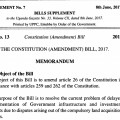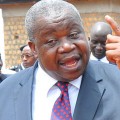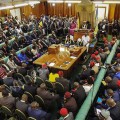A staggering 363,021 Ugandans were displaced due to forced land evictions between January and June 2024, according to a new report by Witness Radio Uganda.
The report documented 90 cases of land evictions during this period, with nearly four incidents occurring weekly, affecting over 15,126 people and threatening 5,060 hectares of land nationwide.
The Central region was the epicenter, recording 52 eviction cases, followed by 24 in the Western region, eight in the Northern region, and six in the Eastern region. Alarmingly, the report estimated that 2,160 Ugandans face eviction daily, with 723 hectares of land at risk of being grabbed every day.
VIOLENCE AND HUMAN RIGHTS VIOLATIONS
Despite government promises and directives from President Museveni to halt evictions, land grabbers have routinely ignored these orders, often resorting to violence. Armed security forces, private militias, and police were reported to have carried out the majority of the evictions.
Of the reported cases, 37 were enforced by armed gangs on behalf of evictors, 25 involved Uganda Police, five were carried out with the participation of UPDF soldiers, and four were linked to private security companies.
“The egregious levels of impunity exhibited by land grabbers have left communities defenseless, creating an environment where their human rights are trampled without consequence,” said Jeff Wokulira Ssebaggala, country director of Witness Radio Uganda.
He called for accountability and justice, warning that the unchecked power of influential individuals and entities leaves marginalized communities vulnerable and without recourse.
DRIVERS OF EVICTIONS: INDUSTRIALIZATION AND LAND-BASED INVESTMENTS
The report identified the government’s push for industrialization and land-based investments as the primary drivers of forced evictions. Land is increasingly targeted for oil and gas extraction, mining, agribusiness and tree plantations for carbon offsets. While some of this land is already under development, other parcels remain vacant but are guarded by military personnel and private security firms.
Ssebaggala emphasized that industrialization must balance economic development with the protection of smallholder farmers’ rights to land and food security.

TRAGIC STORIES
The report highlighted harrowing cases that underscore the human toll of forced evictions. In Nakasongola, smallholder farmer Dan Ssebyala was ambushed and killed by armed men following a confrontation over disputed land. The district has become a hotspot for violent evictions involving absentee landlords and powerful investors.
Ismael Bwowe, a disabled father of 20, recounted how his land was confiscated after he demanded fair compensation. He faced intimidation, arrests and false charges from state authorities, including being accused of robbing an influential individual. Bwowe claimed that Total Energies offered legal support and representation on the condition that he accept their compensation terms.
“I refused,” he said, adding that the pressure to relinquish his land remains intense. The report underscores the urgent need for reforms to address forced evictions, ensure accountability, and protect the rights of vulnerable communities. Without meaningful intervention, Uganda risks deepening inequality and undermining the livelihoods of smallholder farmers who are essential to the country’s food security.
FAMILY JAILED AMID LAND DISPUTE
The plight of Richard Ssebagala, his wife Prossy Namande, and their relative Anania Ngabirano, residents of Kabubu-Kabongo village in Nansana Municipality, Wakiso district, highlights the human toll of Uganda’s ongoing land disputes. The family spent nine months in prison following their arrest on January 10, 2024, under controversial circumstances.
ARREST AND ALLEGATIONS
The arrests occurred at 1am, during a raid by officers from Luweero police station. Police reportedly banged on the doors and forcefully detained the family, accusing them of aggravated robbery. However, the family believes the arrest was a tactic linked to a land dispute with Benon Ntambi, a man who allegedly grabbed their land.
Before the arrests, Ntambi had reportedly destroyed crops, including tomatoes, potatoes, and bananas, on the contested land. While the family was incarcerated, a new building was constructed on their land, which is now occupied, raising further questions about the motivations behind their detention.
CALLS FOR JUSTICE
The case has drawn attention from Witness Radio Uganda, which has urged the government to take immediate action to address land grabbing and illegal evictions. The organization emphasized the need to strengthen land laws and protect vulnerable communities from abuses.
It also called for greater accountability in institutions such as the Uganda Police Force, the army and land registries, which are often accused of corruption and favoritism toward the wealthy.
“The government must prioritize justice for victims of illegal evictions and address systemic corruption that leaves the poor defenseless against land grabbers,” Witness Radio Uganda stated.
BROADER CONTEXT
This case underscores the broader issue of land conflicts in Uganda, where vulnerable families are often caught in disputes with powerful individuals or entities. Advocacy groups warn that the failure to address these issues not only erodes public trust but also perpetuates inequality and injustice.
As the government faces mounting pressure to act, the story of Ssebagala and his family serves as a stark reminder of the urgent need for reforms to protect land rights and ensure justice for those impacted by land disputes.
Source: The Observer


 SPECIAL REPORTS AND PROJECTS4 days ago
SPECIAL REPORTS AND PROJECTS4 days ago
 NGO WORK1 week ago
NGO WORK1 week ago



























